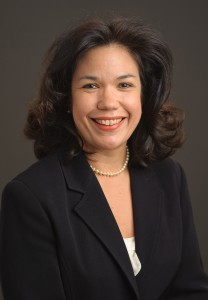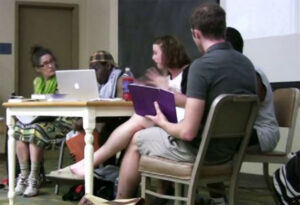For Young Adults, Appearance Matters More than Health, MU Research Suggests
Research Inspires Interactive Theater, Opens Dialogue
By Jesslyn Chew
MU News Bureau
Columbia, Mo. (Aug. 13, 2012) — When it comes to college-age individuals taking care of their bodies, appearance is more important than health, research conducted at the University of Missouri suggests.

María Len-Ríos, an associate professor of strategic communication, Suzanne Burgoyne, a professor of theater, and a team of undergraduate researchers studied how college-age women view their bodies and how they feel about media messages aimed at women. Based on focus group research findings, the MU team developed an interactive play about body image to encourage frank discussions about conflicting societal messages regarding weight, values and healthful choices.
“During our focus group conversations, we learned that young people don’t think about nutrition when it comes to eating,” Len-Ríos said. “They think more about calorie-counting, which isn’t necessarily related to a balanced diet.”
The focus groups included college-age women, college-age men and mothers of college-age women, who discussed how body image is associated with engaging in restrictive diets, irregular sleep patterns and over-exercising.
“We receive so many conflicting media messages from news reports and advertising about how we should eat, how we should live and how we should look,” Len-Ríos said. “Some participants said they realize images of models are digitally enhanced, but it doesn’t necessarily keep them from wanting to achieve these unattainable figures – this is because they see how society rewards women for ‘looking good.'”
The researchers also completed in-depth interviews with nutritional counselors who said lack of time and unhealthy food environments can keep college-age students from getting good nutrition.

“Eating well takes time, and, according to health professionals, college students are overscheduled and don’t have enough time to cook something properly or might not know how to prepare something healthful,” Len-Ríos said.
Based on the focus group conversations and interviews, Carlia Francis, an MU theater doctoral student and playwright, developed “Nutrition 101,” a play about women’s body images. During performances, characters divulge their insecurities about their own bodies, disparage other women’s bodies and talk about nutrition choices. After a short, scripted performance, the actors remain in character, and audience members ask the characters questions.
“When you’re developing something for interactive theater, focus groups and in-depth interviews are great at getting at stories,” Len-Ríos said. “Many of the stories used in the interactive play – like valuing people because of their appearance and not their personal qualities or abilities – came from individuals’ personal experiences.”

Burgoyne says the play helps facilitate dialogues about nutrition, media messages and self-awareness.
“Body image is a sensitive topic, and the play helps open discussions about how individuals view themselves and how media messages influence their self-images,” Burgoyne said. “An easy way to improve individuals’ body images does not exist, but hopefully, the conversations that arise from the performances will help develop ways to counteract the images that the media promote.”
MU student actors debuted the play last spring, and Burgoyne said performances will resume during the upcoming fall semester.
The study, “Confronting Contradictory Media Messages about Body Image and Nutrition: Implications for Public Health,” was presented earlier this month at the annual Association for Education in Journalism and Mass Communication Conference in Chicago.
The undergraduate student researchers were Alison Gammon and Charnissia Smith, journalism majors; Kelsey Davis, health sciences; and Anna Swearingen, psychology.
The project is part of Mizzou Advantage’s food for the future initiative. Mizzou Advantage was created to increase MU’s visibility, impact and stature in higher education locally, statewide, nationally and around the world. Mizzou Advantage is a program that focuses on four areas of strength: food for the future, media of the future, one health/one medicine and sustainable energy. The goals of Mizzou Advantage are to strengthen existing faculty networks, create new networks and propel Mizzou’s research, instruction.
Updated: June 9, 2020
Related Stories
Expand All Collapse All- 2022
- 2019
- 2017
- 2016
- 2015
- 2014
- 2013
-
2012
- Oct 17, 2012 Female Pulitzer Prize Winners Require Higher Qualifications, MU Study Finds
- Oct 17, 2012 MU Researchers Expose Young Adults to News with Online Sports Game
- Sep 12, 2012 Facebook Profile Pictures Influence Perceived Attractiveness, Journalism Study Finds
- Aug 13, 2012 For Young Adults, Appearance Matters More than Health, MU Research Suggests
- Aug 06, 2012 Press Freedom Leads to Happiness, Environmental Quality, Study Finds
- Jul 25, 2012 Journalism Students Produce 10-Part Series on Book Challenges in Missouri's Public Schools
- Jul 13, 2012 Advertisers Could Target Online Audiences More Efficiently with Personality Scale, Journalism Researchers Find
- Feb 02, 2012 Young Scholars Conference to Showcase Research about War and the Press
- Jan 11, 2012 Emotional News Framing Affects Public Response to Crises, MU Study Finds
-
2010
- Oct 13, 2010 MU Researchers Find Celebrity Journalism May Contribute Positively to Consumer Health Behaviors
- Jun 14, 2010 Missouri Journalism Faculty, Students End Academic Year with Impressive Research Record
- Apr 15, 2010 Who Is Injured Determines Who Gets the Blame
- Mar 04, 2010 MU Researcher Finds More Effective Ways to Converge Media
-
2009
- Nov 13, 2009 MU Researchers Find Internet Search Process Affects Cognition, Emotion
- Aug 26, 2009 Online News Garners More Attention from Readers if It's Negative and Localized, MU Study Finds
- Apr 08, 2009 Traditional Media Provides More Comprehensive News Than Citizen Media and Blogs, MU Researchers Find
- 2008
-
2007
- Jul 31, 2007 Portrayal of Journalists in Harry Potter Books Doesn't Negatively Affect Young Readers' Perceptions
- Mar 20, 2007 Negative Newspaper Articles about Clinical Trials Decrease Public Willingness to Participate, Study Finds
- Feb 15, 2007 Newspaper Study: Investing in the Newsroom is Good for Business
- 2006
- 2005
- 2004